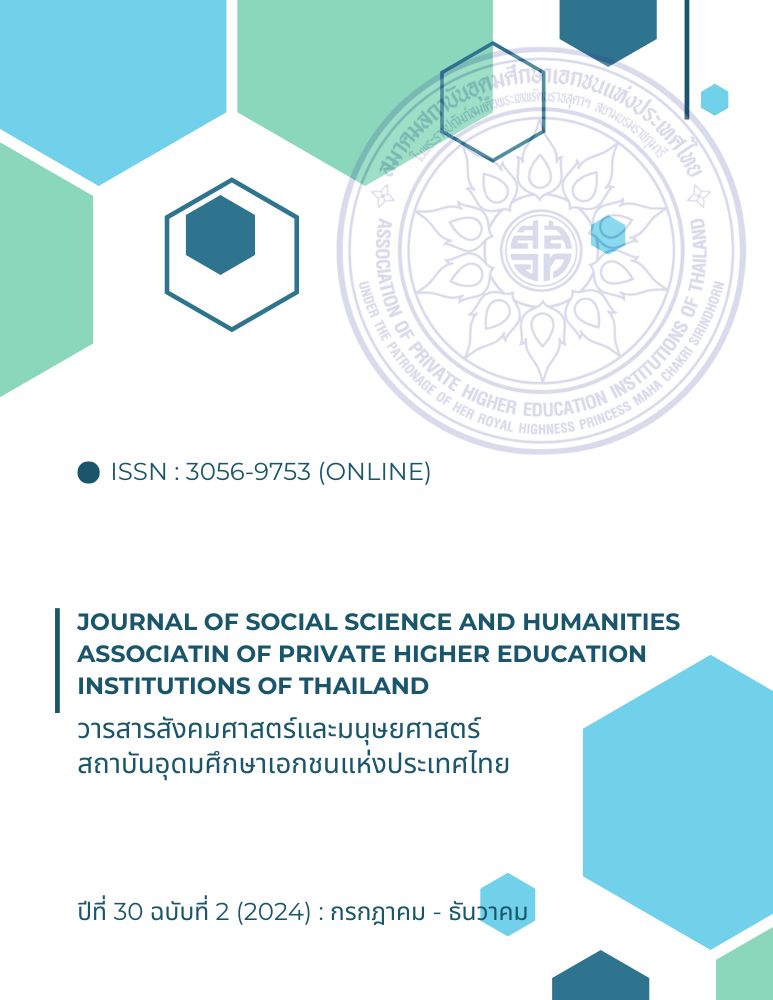การยกระดับบทบาทมหาวิทยาลัยไทยต่อการพัฒนาเมืองสู่เมืองแห่งการเรียนรู้อย่างยั่งยืน
คำสำคัญ:
การยกระดับบทบาทมหาวิทยาลัยไทย, สร้างการมีส่วนร่วมทุกภาคส่วน, การพัฒนาเมือง, เมืองแห่งการเรียนรู้อย่างยั่งยืนบทคัดย่อ
งานวิจัยนี้มีวัตถุประสงค์เพื่อ (1) วิเคราะห์บทบาทของมหาวิทยาลัยในฐานะผู้ประกอบการในการสร้างการมีส่วนร่วมจากทุกภาคส่วนต่อการพัฒนาเมืองแห่งการเรียนรู้อย่างยั่งยืน และ (2) ศึกษาความสัมพันธ์เชิงสาเหตุที่มีอิทธิพลต่อการมีส่วนร่วมที่เป็นตัวกลางระหว่างบทบาทของมหาวิทยาลัยและการพัฒนาเมืองแห่งการเรียนรู้อย่างยั่งยืน การวิจัยใช้กลุ่มตัวอย่างจำนวน 450 คน ซึ่งเป็นผู้บริหารระดับกลางและสูงจากมหาวิทยาลัยรัฐ โดยเลือกกลุ่มตัวอย่างแบบหลายขั้นตอน (Multi-stage sampling) ข้อมูลถูกเก็บรวบรวมผ่านแบบสอบถามประมาณค่า 5 ระดับ และวิเคราะห์ด้วยสถิติเชิงพรรณนา สถิติเชิงอนุมาน การวิเคราะห์ปัจจัย และการวิเคราะห์เส้นทาง (Path analysis) นอกจากนี้ ยังใช้โปรแกรม AMOS ในการวิเคราะห์สมการเชิงโครงสร้าง (SEM) และทดสอบความสอดคล้องกลมกลืนของโมเดลวิจัยที่ระดับความเชื่อมั่น 95% ผลการศึกษาพบว่า บทบาทของมหาวิทยาลัยในฐานะผู้ประกอบการมีอิทธิพลโดยตรงต่อการมีส่วนร่วมของทุกภาคส่วน และการมีส่วนร่วมดังกล่าวมีอิทธิพลโดยตรงต่อการพัฒนาเมืองแห่งการเรียนรู้อย่างยั่งยืน โมเดลวิจัยที่ใช้มีความเหมาะสมสูงโดยมีค่าดัชนี Goodness-of-Fit อยู่ในเกณฑ์ที่ยอมรับ ทั้งนี้ บทบาทมหาวิทยาลัยในฐานะผู้ประกอบการสามารถส่งผลเชิงบวกต่อการพัฒนาเมืองแห่งการเรียนรู้อย่างยั่งยืนผ่านการมีส่วนร่วมทั้งทางตรงและทางอ้อม งานวิจัยเสนอแนะให้มหาวิทยาลัยพัฒนาแนวทางการเสริมสร้างระบบนิเวศนวัตกรรม ส่งเสริมการมีส่วนร่วมจากทุกภาคส่วน และสนับสนุนการเรียนรู้ตลอดชีวิตในเมือง เพื่อขับเคลื่อนการพัฒนาเมืองแห่งการเรียนรู้อย่างยั่งยืนต่อไป
เอกสารอ้างอิง
เฉลิมชัย บุญยะลีพรรณและคณะ (2565). ความเหลื่อมลํ้าทางสังคมของไทย ในมิติด้านการศึกษา เศรษฐกิจ และสาธารณสุข.วารสารสังคมศาสตร์ มหาวิทยาลัยศรีนครินทรวิโรฒ. 25(2). 240-261.
สุบรรณ เอี่ยมวิจารณ์และสุธินี อัตถากร (2567). เมืองแห่งการเรียนรู้ : แนวคิดการพัฒนาและสร้างความรู้เพื่อการพัฒนาเมืองอย่างยั่งยืน. วารสารสถาบันวิจัยและพัฒนา. มหาวิทยาลัยราชภัฏมหาสารคาม, 11(1). 851-864.
สำนักงานคณะกรรมการการอุดมศึกษา. (2561). แผนการศึกษาแห่งชาติ พ.ศ. 2560-2579. สำนักงานคณะกรรมการการอุดมศึกษา.
สำนักงานสภาพัฒนาการเศรษฐกิจและสังคมแห่งชาติ. (2565). แผนพัฒนาเศรษฐกิจและสังคมแห่งชาติ ฉบับที่ 13. สำนักงานสภาพัฒนาการเศรษฐกิจและสังคมแห่งชาติ.
Apostol, S. (2022). Universities in Today’s World-between the Potential Regional Growth and Market Economy Absorption. Management & Marketing. 17(s1), 449-470
Altbach, P. G., & Knight, J. (2007). The Internationalization of Higher Education: Motivations and Realities. Journal of Studies in International Education, 11(3-4), 290-305.
Abreu, M. & Grinevich, V. (2024). The Entrepreneurial University: Strategies, Processes, and Competing Goals. The Journal of Technology Transfer. 49.1991-2034. Retrieved from https:// doi.org/ 10. 1007/s10961-024-10085-7
Audretsch, D. B., et.al. (2006). Entrepreneurship and economic growth. Oxford University Press.
Bryman, A. (2011). Leadership in organizations. Sage.
Cai, Y., & Ahmad, I. (2023). From an Entrepreneurial University to a Sustainable Entrepreneurial University: Conceptualization and Evidence in the Contexts of European University Reforms. Higher Education Policy. 36, 20–52.
Chong Peng & Hongwei Xu. (2024). Universities and Cities: The Impact of Higher Education on Urban Innovation, Entrepreneurship, and Economic Growth. Asian Economic Papers, 23(2), 33–56
De Wit, H. (2011). Trends, Issues, and Challenges in Internationalization of Higher Education. Centre for Applied Research on Economics and Management.
Dill, D. D. (2005). The Public Good, the Market, and Quality Assurance: a Conceptual Framework for Higher Education Policy. Higher Education, 49(1-2), 71-91.
Etzkowitz, H., & Leydesdorff, L. (2000). The Dynamics of Innovation: From National Systems and Mode 2 to aTriple Helix of University-Industry-Government Relations. Research Policy, 29(2), 109-123.
Fayolle, A., & Gailly, B. (2008). From Craft to Science: Teaching Models and Learning Processes in Entrepreneurship Education. Journal of European Industrial Training, 32(7), 569-593.
Facer, K., & Buchczyk, M. (2019). Towards a Research Agenda for the Actually Existing Learning City. Oxford Review of Education, 45(2), 151-167.
Fornell, C., & Larcker, D. F. (1981). Evaluating Structural Equation Models with Unobservable variables and measurement error. Journal of Marketing Research, 18(1), 39–50.
Gibb, A. A. (2002). In Pursuit of a New Enterprise and Entrepreneurship Paradigm for Learning: Creative Destruction, New Values, New Ways of Doing Things, and New Combinations of Knowledge. International Journal of Management Reviews, 4(3), 233-269.
Hair, J. F., et.al.(2012). Multivariate data analysis (7th Ed.). Pearson.
Kearns, P (2012). EcCoWell: Living and Learning in Sustainable Opportunity cities, Retrieved from http://pie.pascalobservatory. org.
Kirby, D. A. (2006). Creating Entrepreneurial Universities in the UK: Applying Entrepreneurship Theory to Practice. The Journal of Technology Transfer, 31(5), 599-603.
Kline, R. B. (1998). Principles and Practice of Structural Equation Modeling. Guilford Press.
Li, X., et.al. (2022). University-Industry Cooperation and Regional Economic Convergence: The Role of Human Capital. Journal of the Knowledge Economy, 13(2), 456-478.
Longworth, N (1999). Making Lifelong Learning work: Learning cities for a Learning century, Sterling, VA: Stylus Publishing.
Marozau, R., et.al. (2021). Impacts of universities in different stages of economic development: a cross-country analysis. Journal of the Knowledge Economy, 12(1), 1-21.
Nunnally, J. C., & Bernstein, I. H. (1994). Psychometric theory (3rd Ed.). McGraw-Hill.
Peng, C., & Xu, H. (2024). Universities and Cities: The Impact of Higher Education on Urban Innovation, Entrepreneurship, and economic growth. Asian Economic Papers, 23(2), 33–56.
Perkmann, M., et.al. (2013). Academic engagement and commercialization: A review of the literature on university–industry relations. Research Policy, 42(2), 423–442.
Pittaway, L., & Cope, J. (2007). Entrepreneurship Education: A Systematic Review of the Evidence. International Small Business Journal, 25(5), 479–510.
Pfeffer, J., & Salancik, G. R. (2003). The external control of organizations: A resource dependence perspective. Stanford University Press.
Polishchuk, Y., et.al. (2021). University Impact on Regional Development in the Context of Smart Specialization. Education of Economists and Managers, 59(1), 59–83.
Saha, N., et.al. (2020). Entrepreneurial Universities and Regional Innovation Systems: a Strategic role in Innovation-driven Economic growth. Journal of Innovation and Entrepreneurship, 9(1), 12–24.
Senge, P. M. (1990). The fifth discipline: The art and practice of the learning organization. Doubleday.
UNESCO (2024). UNESCO Global Network of Learning Cities. Retrieved from https://www.uil.unesco. org/en/learning-cities.
United Nation (2024). THE 17 GOALS - Sustainable Development Goals. Retrieved from https://sdgs. un.org/goals
Wright, M., et.al. (2007). Academic entrepreneurship in Europe. Edward Elgar Publishing.
ดาวน์โหลด
เผยแพร่แล้ว
รูปแบบการอ้างอิง
ฉบับ
ประเภทบทความ
สัญญาอนุญาต
ลิขสิทธิ์ (c) 2024 วรชัย วิภูอุปรโคตร

อนุญาตภายใต้เงื่อนไข Creative Commons Attribution-NonCommercial-NoDerivatives 4.0 International License.





